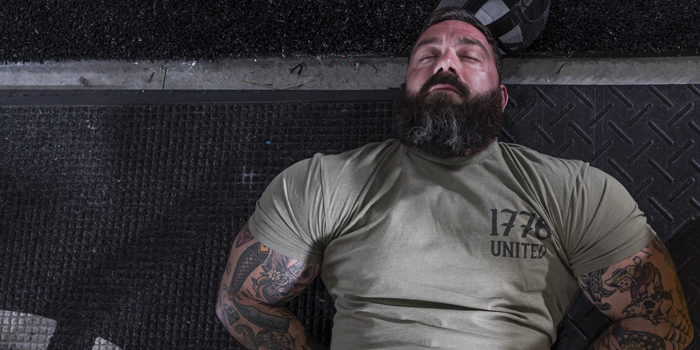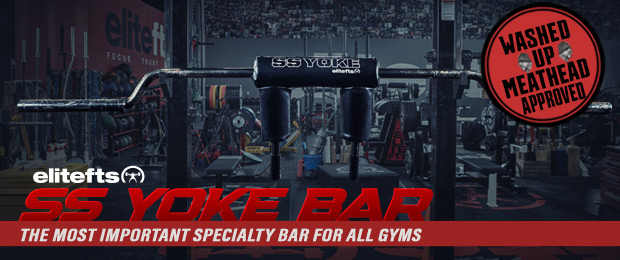
The death of the training crew in recent years has been one of the most troubling trends in powerlifting. As social media has infiltrated the lifting scene, people have all but abandoned the classic training crew, preferring to be some "lone wolf" or another embarrassing cliche.
elitefts recently polled how many of their viewers are training with a crew or alone. The poll results are staggering—88% of lifters polled responded that they train alone. As someone who also trained alone at one point in my powerlifting career, who then found a team and watched my lifts soar to heights I never imagined, I just had to write about this topic.
Historically, powerlifters sought other strong and like-minded individuals to train alongside. It wasn't uncommon to see doctors and lawyers train with ex-cons and drug dealers—they were all brothers and sisters in iron despite their wildly different backgrounds. These combinations gave way to some of the most legendary clubs in the history of strength sports; Westside Barbell, Big Iron Gym, and Bullfarm, to name a few. Lifters would travel from hours away because they understood the value of a team.
RECENT: 3-Day Conjugate Split for the Raw Lifter
These days, the concept of team is extremely rare. More and more people want to put their headphones on and grind rep after rep, set after set, with no one but themselves. No matter how "hardcore" these people think they are, they're being held back.
Many people seem to have this idea that a training crew is only valuable to motivate you, then they typically follow that up with some wild claim that they don't need motivation or are somehow above it.
While motivation is certainly a factor, it is far from the sole reason to train with a team.
Yes, a crew will push you to do better, they'll bring an intensity that a lone lifter can rarely duplicate, and they'll do it every session.
They'll push the pace, convince you to load the extra weight, and hit that new PR.
But there's more to it than that.
Here are three ways you're screwed without a crew.
1. You Won't Develop a Sense of Belonging and Responsibility
Responsibility builds character. It's one of those things that I implore everyone in my circle to take on, as it helps them develop.
Without responsibilities, people often become idle and lack direction. When you know you have to be there for your crew on a specific day and time, so they have the help they need during meet prep (or any other time, for that matter), you will be more focused and motivated to do well.
You'll know that their success relies, in part, on you. You'll see that you don't want to waste all of their hard work, time, and effort in the proceeding months because you weren't there for them when they needed you. You'll also know that the same will apply when it's time for them to help you. This is what happens when you belong to something bigger than yourself, and this truly is a team effort. When you form a bond with your teammates, you become more in tune with one another, and you grow together.
We believe heavily in team building at the JAC (our small, private training crew in Mt Pleasant, MI). We have team dinners every Sunday night after our max effort session. Lifters travel for several hours to be a part of this because they understand the importance.
Let's be clear here. We're not only talking about some intermediate lifters from around the way traveling 20 minutes to squat (we do have a couple of those, and there's nothing wrong with that). We're mostly talking about elite raw and equipped lifters across several different weight classes and divisions traveling from as far as a neighboring state.
We are a team. We lift, eat, and travel together. We wear our team shirts and have each other's backs, no matter what.
Until you've stood in front of a rack, ready to take a weight with confidence that you've never felt before, knowing it can injure you in a way that will change your life forever, you'll never know the intensity that a team can bring to you.
Some of my biggest milestone lifts have come because of this feeling. I have just as much a responsibility to them as I do myself, and we all feel the same way. We belong to something bigger than any individual.
2. Good Luck Staying Safe Without a Spot
Safety and spotting are two topics I see many people concerned about in the comments sections on videos and articles, which confuses me as the vast majority of these people admit they are training alone.
Sure there are safeties in most modern racks. They make safety straps for monolifts and face savers for the bench press, but none of these duplicate the degree of safety you get from having training partners there to spot you.
As I mentioned in my previous point, having a team with your best interest and safety in mind is invaluable for your confidence, mindset, and safety.
Would you rather get folded over with a squat and wait for the straps or pins to catch it, hopefully before you get injured, or would you take more comfort in knowing that your team is going to catch you the second you get out of sorts?
As you train with people over time, they know what your lifts should look like, what kind of bar speed and path you normally have, and what positions you do and don't recover from. They develop a keen sense of you as a lifter and when you're in trouble. This allows them to react faster than any inanimate object ever could or any clueless random that you tap for a spot in your local gym.
If you're truly worried about safety, a crew is the most valuable tool you can have at your disposal.
3. You'll Have a Harder Time Identifying Problems in Technique
Technique critique and weak point assessment are possibly the biggest factors in improving one's lifts. I can't tell you how many times I and the other coaches and lifters from team elitefts helped trainees to hit massive (sometimes 50+ pounds) PRs in ONE SESSION at the old Learn To Train Seminars.
So many people have technique flaws that may not appear on video or that they aren't aware of in the first place. As much as everyone likes to think that they know what perfect form is and that they somehow possess it, very few do. After 20+ years competing and well over ten years coaching some of the strongest lifters on the planet, I can confidently say that I neither have perfect form nor have I trained anyone to absolutely flawless technique.
For 99% of lifters, there will always be something to work on. After you get one thing right, something else will develop and need attention. This could be as simple as telling someone to pull their elbows under the bar on a squat or get their head up earlier on a deadlift.
It may be something more time-consuming, like weak triceps requiring specific exercises to improve the bench lockout. Or something even harder to identify and correct, such as a hip shift in the hole due to past injuries and muscular imbalances. Whatever it may be, you have a better chance of identifying and correcting it if you have a team that trains with you daily.
Many lifters have a bad tendency to do the things they like in the gym rather than what they need. Sometimes these things are the same, but quite often, they are drastically different. Few people like using the SS Yoke Bar, but it's one of the most beneficial bars for building the squat and the deadlift. The bar heavily stresses the abdomen and upper back muscles, often weak points people are unaware of. I would not use this bar as often as I do if it weren't for my team pushing me to do it. It sucks, it's humbling, and it makes me feel like I was hit by a truck after a heavy squat or good morning session. But it also makes my lifts go up more than any other specialty bar.
We have a lifter who, for whatever reason, never wants to do his triceps work. He has no choice when the whole team gets done benching and goes straight into JM presses or rolling dumbbell extensions. Because of this, his once stagnant bench is now growing again.
Conclusion
Many of you reading this article will think these things don't apply to you. To you folks, I say you need it more than anyone. Don't believe me? Sign up for a Train Your Ass Off session at the elitefts compound, or even seek out a team of experienced lifters near you. You can often find these teams through social media or, better yet, at powerlifting meets, where real powerlifting happens. Most training crews will be happy to give you an "audition." You'll often learn more in a single session than you did in your last year scouring social media and message boards.
Can you be successful without a training crew? Sure, of course, it's possible. Many people have done it. Those many people have historically been statistical outliers with excellent genetics. As far as we mere mortals are concerned, a team will take you to heights you otherwise will not reach. I would also argue that many of those genetic specimens that had great success training on their own would have been even greater had they trained with a crew.
It's very doubtful that I would have ever gotten to an elite total in powerlifting had I continued to train on my own. After six years of training alone, I wasn't there. Within one year of training with a crew, I hit my first elite. Six months later, I got a pro total. Then a year after, another pro total in a second division.
I'm now turning 40 and approaching my elite total in a fourth division within the men's open class. I use both elite and pro designations here as it seems pro totals are only clearly defined in the equipped division, whereas the raw division appears to still peak at elite. Either way, we're talking about the highest possible designation within a division. My training crew has been one of the main driving forces in this success, and they will keep me going for years to come.
Don't screw yourself over. Find a crew and grow. Find something to belong to that will make you better, and it will carry over into other aspects of your life. Responsibility and effort build character, something none of us can ever have too much of.
Zane Geeting is a competitive powerlifter with over 20 years of experience. He has achieved both raw and equipped elite totals across three weight classes. Zane also coaches several elite lifters from across the US and Canada.











2 Comments